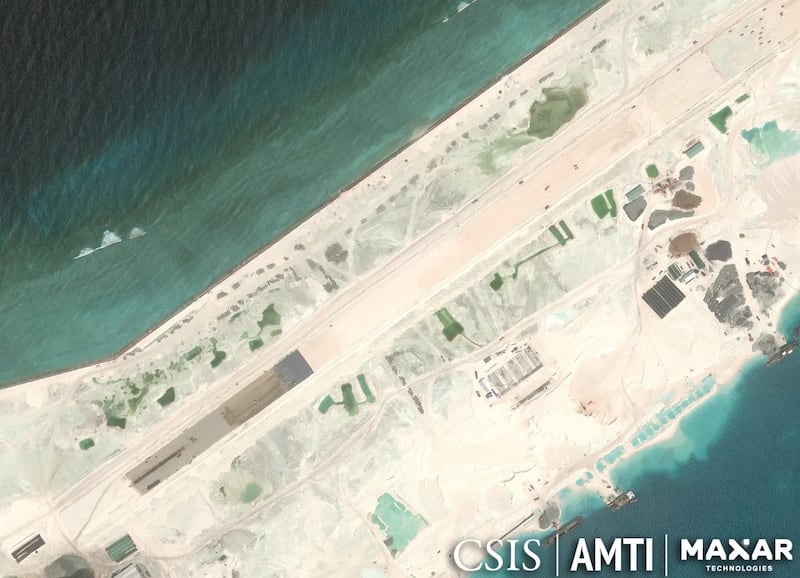Malaysia has protested over Vietnam’s island building in the South China Sea in a rare negative exchange between the neighbors, Reuters news agency cited Malaysian officials as saying.
Late last month, Radio Free Asia reported on Vietnam’s development of an airstrip on Barque Canada reef, an artificial island within the Spratly archipelago that Malaysia also claims. The reef’s landfill area is estimated to have expanded to nearly 2.5 square kilometers (617.7 acres) as of October 2024, more than doubling in a year.
Two unidentified officials told Reuters that the Malaysian government sent a letter of complaint to Vietnam’s foreign ministry in early October, before RFA’s report, “but has so far received no reply.”
Malaysia and Vietnam are among the six parties that hold overlapping claims in the South China Sea and to its numerous islands and reefs, alongside China, Brunei, the Philippines and Taiwan.
The Philippines has said it was “monitoring” Vietnam’s island-building activities but has not officially protested.
The recently leaked letter of complaint, if true, could be a rare point of tension as until now Malaysia has only complained about Vietnamese fishermen’s “illegal activities” in Malaysian waters.
Kuala Lumpur claims at least 12 features in the Spratlys, including Vietnam-controlled Amboyna Cay and Barque Canada reef, and Philippines-controlled Commodore and Rizal reefs. Malaysia has a physical presence on five features - Swallow, Ardasier, Erica, Mariveles and Investigator reefs – which are also claimed by some other parties.
Due to the complexity of those overlapping claims, regional countries generally stay quiet about their neighbors’ island building and instead focus their attention on China, which has reclaimed the most land in the South China Sea and completed the militarization of three large artificial islands.

Anwar visits China
Malaysia has repeatedly rejected China’s claims in the South China Sea, most recently in 2023 over the latest edition of the Beijing-issued standard map of China, which encompasses areas lying off the coast of Malaysian Borneo.
Prime Minister Anwar Ibrahim has reiterated on many occasions that Malaysia would continue to conduct oil and gas exploration in Malaysia’s exclusive economic zone in the South China Sea, despite objections from China.
Anwar is in China on an official visit from Nov. 4-7, his third in two years, and observers say the trip signals a closer relationship between Malaysia and its big neighbor.
“That may explain if there is any recent friction between Malaysia and Vietnam, which has had big issues with China in the South China Sea,” said Viet Hoang, a Vietnamese maritime expert.
The Chinese government has not said anything publicly about the reclamation works done by Vietnam but Chinese analysts have warned about the risk of a new flashpoint.
RELATED STORIES
Vietnam expands strategic capabilities in South China Sea
Increased risk of conflict in South China Sea, forum warns
East Asia fails to adopt South China Sea statement amid finger pointing
Malaysia is the rotating chair of the Southeast Asian grouping ASEAN in 2025 and its support would bolster China’s confidence in disputed waters, Viet said.
For its part, “Anwar’s government seems to view China as a significant economic opportunity and is willing to set aside other issues to pursue this opportunity,” said Ian Chong, an associate professor of political science at the National University of Singapore.
However, if Kuala Lumpur managed to carry on with some oil projects it is mainly thanks to the fact that “they’ve had a longer history of conducting such projects and are physically further away from China,” Chong said.
Edited by Mike Firn.
